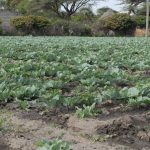We study production practices of larger and more capital-intensive farmers (“horti-preneurs”) in horticultural commercial clusters in the central Rift Valley of Ethiopia. Attracted by profitable vegetable markets, more educated farmers rent in land for vegetable production from a large number of smallholders to meet rapidly growing urban vegetable demand. We find that these hortipreneurs obtain more than double the profit per unit of land compared to smallholders. Compared to smallholders, horti-preneurs grow different vegetables – particularly those that require more upfront investments – and in the case that they grow the same crops as smallholders, we find that they use significantly more inputs, such as fertilizer, agro-chemicals, and labor; have higher production costs; and obtain better yields. Moreover, they are also more efficient and able to produce better quality vegetables and obtain better prices. This increasing emergence of more efficient medium-scale farmers in supplying local urban markets challenges the traditional smallholder model in Africa, at least for horticulture. Read more.
